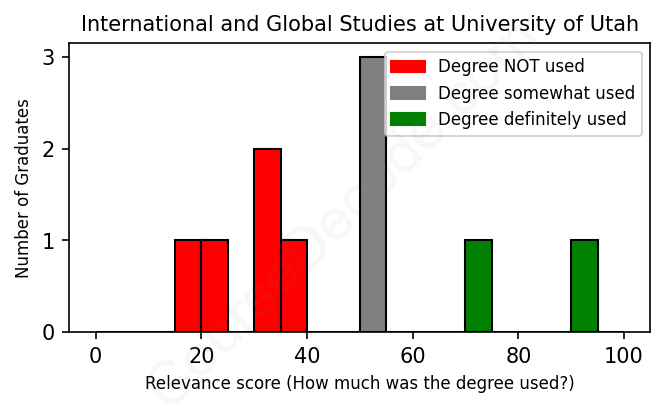
First, some facts. Of the International and Global Studies graduates from University of Utah we've analyzed , here's how many have used (or NOT used) their degree in their career:

These are estimates based on AI analysis of 10 LinkedIn profiles (see below).
The verdict? Bad. Overall, with an average relevance score of 46%, International and Global Studies graduates from University of Utah have a substantially lower likelihood (-21%) of finding work in this field compared to the average graduate across all fields:
And for comparison, here's the chart for all profiles we've looked at across all degrees.
Also, after graduating, 60% of these graduates have pursued further education other than another Bachelor's degree (such as a Masters degree or other), compared to the average across all profiles of 35%. This suggests you may need more than just a Bachelors degree to be competitive as a International and Global Studies graduate.
See the details:
|
Relevance score: 19% We think this person has NOT gone into a career related to their degree. We think this person has NOT gone into a career related to their degree.
DEGREE INFOGraduated in 2017 from University of Utah with a Bachelor of Arts - BA in International and Global Studies. Also pursued further education since (see below). JOB HISTORY SINCE GRADUATIONAML Analyst American Express Sep 2019 - Mar 2020 Business Systems Consultant  Wells Fargo Mar 2020 - Sep 2020 Mortgage Loan Originator  Gateway Mortgage Sep 2020 - Jul 2021 Private Investments Analyst  Assure Jun 2021 - Jun 2022 Head of Operations and Investor Relations  Assure Syndicates Mar 2022 - Jun 2022 Field Services Engineer  Beckman Coulter Diagnostics Feb 2023 - Present FURTHER DEGREES DONE SINCE GRADUATINGMaster of Science - MSTrinity College Dublin 2018 - 2019 ABOUTInnovative and customer-centered financial professional with 10 years experience in banking, research, sales, and investors relations. Directed finance, operations, and relationships in all aspects of venture capital, private equity, and investment transactions. Collaborate with Sales, Operations, and Tax internal business partners to drive growth and financial performance. A self-motivated, results-driven problem solver. |
The top 10 most common jobs done by the graduates we've analyzed (ranked most common to least) are:
From the analysis of LinkedIn profiles of individuals who graduated with a degree in International and Global Studies from the University of Utah, it appears that many of them have ventured into a variety of roles that aren't directly tied to their field of study. Common job titles include positions like administrative assistants, project managers, business analysts, and roles in the technology sector, such as software engineers and quality assurance analysts. These jobs often emphasize operational skills, financial processes, or technical expertise rather than a deep engagement with global issues or international relations, which are the core components of International and Global Studies.
Overall, while there are some instances where graduates have found positions that utilize their degree—like roles in research or global policy—many have ended up in jobs where their International and Global Studies knowledge is either not relevant or only marginally applicable. This may suggest a mismatch between the degree's focus and the job market's demands, or perhaps that graduates are exploring diverse career paths that leverage other skills they've acquired. So, while some graduates do find roles closely connected to their studies, a significant number seem to be working in fields where their degree's relevance is quite limited. It's an interesting mix and could be something to think about if you're considering pursuing International and Global Studies yourself!
Here is a visual representation of the most common words in job titles for International and Global Studies graduates (this is across all International and Global Studies graduates we've analyzed, not just those who went to University of Utah):

When looking at the career trajectories of University of Utah graduates with a degree in International and Global Studies, it’s a mixed bag. Right after graduation, many seem to start in entry-level positions, often in administrative or coordinator roles. For example, some have taken positions as secretaries, program coordinators, or various support roles in organizations. This initial step isn’t atypical for many college graduates; they often need to build experience in a professional environment before moving into more specialized fields related to international studies.
As we look five to ten years down the line, it’s clear that some graduates have transitioned into roles that are more aligned with their education. For instance, there are individuals who have moved into project management, consulting, and higher-level positions within organizations focused on community action or urban planning—areas that connect back to global issues. However, not everyone has stayed on that path; some have ended up in unrelated sectors such as tech or real estate, and others have taken on roles in operational support rather than directly engaging with international or global initiatives. Overall, there is a blend of outcomes—some graduates are making strides in relevant careers, while others have drifted into different fields altogether. It’s important to acknowledge that the path can vary greatly from one individual to another, and finding a direct connection to International and Global Studies isn’t always guaranteed right after college.
Getting a Bachelor’s degree in International and Global Studies at the University of Utah isn't generally considered super hard, but like any degree, it comes with its challenges. You’ll definitely have to stay on top of reading, writing papers, and keeping up with current events, which can be a lot if you're not super interested in global issues. The workload is usually manageable, especially if you’re good at time management and you enjoy learning about different cultures, politics, and economies. Some classes might be more demanding than others, especially if they involve research or theory-heavy content, but overall, it’s seen as a degree that balances rigor with interesting material, so as long as you’re engaged, you should do just fine!
Most commonly, in the LinkedIn profiles we've looked at, it takes people 4 years to finish a Bachelor degree in International and Global Studies.
Looking at these job histories, it seems like a mixed bag when it comes to how much money these International and Global Studies grads from the University of Utah have made. While some of them have definitely climbed the ladder into more managerial or specialized roles, especially the ones who graduated a bit earlier, others appear to have had more modest positions. For instance, the early positions like secretaries and administrative assistants are usually on the lower end of the pay scale, while roles like Executive Director or Product Manager can pull in a decent salary. Overall, some appear to be doing well and making solid money, especially those who transitioned into fields like tech or management, while others might still be figuring things out in positions that likely don't pay as well.
Here is a visual representation of the most common words seen in the "about" section of LinkedIn profiles who have a Bachelor degree in International and Global Studies (this is across all International and Global Studies graduates we've analyzed, not just those who went to University of Utah). This may or may not be useful:

Here are all colleges offering a Bachelor degree in International and Global Studies (ordered by the average relevance score of their International and Global Studies graduates, best to worst) where we have analyzed at least 10 of their graduates:
| College | Score | Count |
|---|---|---|
 American University American University
|
67 | 16 |
 University of North Carolina at Chapel Hill University of North Carolina at Chapel Hill
|
61 | 13 |
 UC Santa Barbara UC Santa Barbara
|
49 | 14 |
 University of Utah University of Utah
|
46 | 10 |
 University of California, Santa Barbara University of California, Santa Barbara
|
41 | 11 |